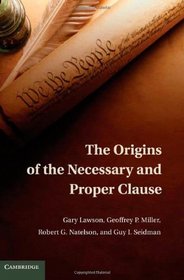Often called the “elastic clause,” the necessary and proper clause simply states that Congress has the power, “To make all Laws which shall be necessary and proper for carrying into Execution the foregoing Powers, and all other Powers vested by this Constitution in the Government of the United States, or in any Department or Officer thereof.”
In Federalist 33, Alexander Hamilton asserted that the necessary and proper clause (along with the supremacy clause) merely stated a truism and gave no additional power to the federal government.
It may be affirmed with perfect confidence that the constitutional operation of the intended government would be precisely the same, if these clauses were entirely obliterated, as if they were repeated in every article. They are only declaratory of a truth which would have resulted by necessary and unavoidable implication from the very act of constituting a federal government, and vesting it with certain specified powers.
Of course, that was before he pulled a classic bait-and-switch after ratification and used it to justify the power to charter a national bank. Thomas Jefferson vehemently opposed Hamilton’s suddenly loose construction.
The Constitution allows only the means which are ‘necessary,’ not those which are merely ‘convenient’ for effecting the enumerated powers. If such a latitude of construction be allowed to this phrase as to give any non-enumerated power, it will go to everyone, for there is not one which ingenuity may not torture into a convenience in some instance or other, to some one of so long a list of enumerated powers. It would swallow up all the delegated powers, and reduce the whole to one power, as before observed. Therefore it was that the Constitution restrained them to the necessary means, that is to say, to those means without which the grant of power would be nugatory.
During the Virginia ratifying convention, George Nicholas testified to the fact that the necessary and proper clause does nothing to expand powers, attempting to soothe the minds of those who feared the federal government would take it that way.
Suppose it had been inserted at the end of every power, that they should have the power to make laws to carry that power into execution; would this have increased their powers? If therefore it could not have increased their powers, if placed at the end of each power, it cannot increase them at the end of all. This clause only enables them to carry into execution the powers given them, but gives them no additional power.
So what exactly does “necessary and proper” mean?
Legal documents delegating power commonly contain a necessary and proper clause, and it has a precise, specific definition that was well-understood in the founding era. Basically, it allows an agent to exercise powers not explicitly spelled out in the legal document, but necessary to exercise the specific authority given to him.
For example, let’s say I write out a contract granting you the authority to run my grocery store. I don’t need to specify that you have the power to pay a guy to clean the floors, or hire a mechanic to fix a freezer when it goes down. Those powers are necessary and proper to running a grocery store. But necessary and proper powers don’t give you the right to give away all of the food items in my store and turn it into a pornography shop.
According to constitutional scholar Rob Natelson, as the framers understood the concept, any necessary and proper power remains constrained by specific criteria. The power must be:
- Necessary to carry out the original purpose – like purchasing corn from a farmer to sell in the grocery store.
- A customary way of carrying out the original purpose. The guy running my grocery couldn’t get rid of all the food and sell porno because that would clearly not constitute a customary way of running a grocery store
- An incidental power can never rise to a level greater than the original power delegated. My grocery store manager would have the authority to pay a mechanic for fixing the broken freezer. But he wouldn’t have the power to sell the building and invest the money in the stock market for me.
The necessary and proper clause does not add anything to the authority already delegated to Congress. It does not allow for the creation of new powers. The clause simply reaffirms that the federal government possesses the flexibility to exercise the enumerated powers already delegated.
Nothing more.
Nothing less.
- 1761: When American Independence was Born - February 13, 2026
- Writs, Riots, and Redcoats: Hancock’s Spark of the Revolution - January 17, 2026
- The National Bank That Breached the Articles of Confederation - June 2, 2025

